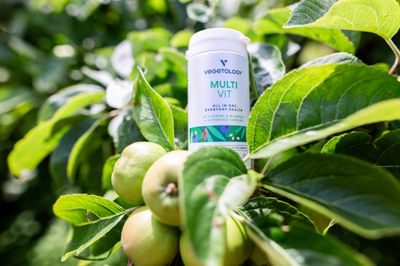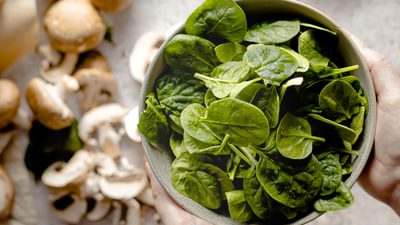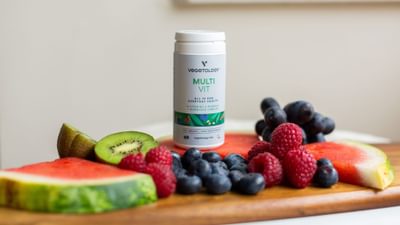
Biotin plays a crucial role in the metabolism of carbohydrates, fats, and proteins.
What does Biotin do?
Biotin, also known as vitamin B7 or vitamin H, is a water-soluble vitamin that has huge benefits to the body. In our bodies Biotin helps with:
Found naturally in a wide variety of foods, including eggs, liver, nuts, seeds, fish, meat, dairy products and certain vegetables like sweet potatoes and spinach, getting Biotin out of what we eat isn’t usually a problem but we can also look to boost our intake by taking a regular Biotin supplement too.

Will Biotin make my hair grow?
Biotin is often associated with promoting hair growth and improving hair health, and many people look to it to help fight hair loss or thinning hair. Having a deficiency of Biotin can lead to less hair or thinning hair, and supplements with this vitamin in can help to improve hair health and promote hair growth alongside other vitamins and nutrients for well being.
It's important to note that our hair growth is influenced by various factors, which are completely individual to us. This can include genetics, hormonal balance, overall health as well as lifestyle factors. Biotin is just one of many nutrients that play a role in maintaining healthy hair, and its effects on hair growth may vary from person to person and it’s also important to note that it’s not an ‘instant fix’ as you’ll need to take it consistently and regularly over time to see results.
How often should I take Biotin?
Knowing how often to take your Biotin can vary depending on your age, health and any specific health concerns, but in general, most adults can safely take Biotin supplements at doses ranging from 30 to 100 micrograms (mcg) per day.
As Biotin is a water-soluble vitamin, this means that any excess amounts are usually excreted in the urine rather than stored in the body. This essentially means the body is never taking more than it needs and this means it’s usually considered safe to take a Biotin supplement daily. You might consider taking it alongside your daily multivitamin or Vegan Multivitamin Tablets.
If you’re just beginning your Biotin journey then you can always start off with a lower dose and increase it as you need, and this can allow your body to adjust to it and minimise the risk of any potential side effects.
When taking this vitamin, make sure you follow the dosage recommendations provided on the supplement label and always speak to your GP or healthcare professional before starting any new supplement plan to ensure it's the right one for you.
It’s important to note that Biotin is also found naturally in a variety of foods, including eggs, nuts, seeds, fish, meat, dairy products and certain vegetables. Consuming a balanced diet that includes these foods can help ensure you're getting an adequate intake of Biotin and other essential nutrients for overall health and wellbeing.

Is Biotin safe?
In general, Biotin is considered safe for most people when taken at recommended doses. It is a water-soluble vitamin, which means that any excess amounts are typically excreted in the urine rather than stored in the body. As a result, the risk of toxicity from taking Biotin supplements is low.
However there are some factors to bear in mind which include taking the correct dosage, pregnancy and breastfeeding and getting the approval from your doctor if you’re planning to take Biotin and any underlying health conditions as these may have required medications which might not work well with a Biotin supplement.
Overall, when taken at recommended doses, Biotin supplements like most Hair, Skin and Nail Vitamins are generally safe for most people. However, it's important to use them responsibly and under the guidance of your GP or healthcare professional, especially if you have any underlying health concerns or are taking medications.
What are the side effects of Biotin?
Biotin supplements are generally considered safe for most people when taken at recommended doses. However, some individuals may experience side effects, especially at high doses. Common side effects can include:
If you have any concerns about potential side effects or interactions with other medications or supplements that you currently take, first speak with your GP or a health professional to discuss if it’s wise to start taking a Biotin supplementation.
So which products would we recommend to increase your biotin intake?
Daily multivitamin with 23 Vitamins & Minerals with Soy Isoflavones, Sage and Ashwagandha.
As our bodies change, so do our nutritional needs. Receive targeted support with our Menopause supplement, scientifically formulated to provide an optimum balance of 23 vitamins and minerals together with Soy Isoflavones and active botanicals. Combining ingredients often only available individually, each capsule is designed to combat multiple effects of menopause and perimenopause such as mood changes, weak bones, and low energy levels. It has been designed to enable optimum absorption and bioactivity of each nutrient in the body.
MultiVit Vegan Supplements
26 vitamins & minerals + superfood complex, containing 50µg of biotin.
Support your physical and mental well-being with our MultiVit, featuring a blend of 26 essential vitamins and minerals, along with our "superfood" antioxidant complex, to supply critical nutrients commonly lacking in vegan or vegetarian diets. This distinctive blend also contains amino acid chelates for improved nutrient absorption and effectiveness within the body.